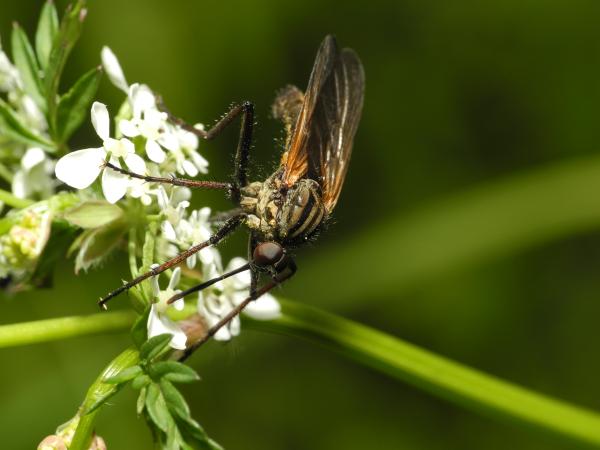We all have this image of mosquitoes as incredibly thirsty little blood-suckers. And we're not far from wrong — at least when it comes to the females of the species (they need blood to help them reproduce). But both genders need sugar for energy — which they get from flowers. And some clever scientists are trying to exploit this need to vanquish the insects — and thus the diseases (such as malaria and dengue) that they carry.
Dr. Agenor Mafra-Neto from ISCA Technologies and colleagues from various universities reported at the annual meeting of the American Chemical Society that they have devised a blend of chemicals that contain both an insecticide and a group of chemicals that mimic mosquito attractants (their work is covered by Science Daily). They were careful to avoid any that might attract bees, thus lessening the potential threat to those important pollinators.
The researchers used sophisticated technology (gas chromatography-electroantenno-graphic detection) to identify the fragrant (to mosquitos, at least) chemicals that various flowers produced. Then they presented the various chemicals to mosquito antennae and noted which ones had an effect. The effective chemicals were then blended with an insecticide — the combination can be used as a spray or a gel, and it could be applied to plants or inanimate objects. The great advantage to this formulation is that nearby plants and structures can be insecticide-free, thus reducing any possible risk to other creatures (including us).
When the researchers tested the new formulation in villages in Tanzania, whose population is at high risk of malaria, they found that the mosquito population "plunged by two-thirds in just two weeks" in the villages treated with it.
There are literally thousands of species of mosquitoes, but only three carry human diseases. The Anopheles mosquitoes are the ones that harbor the malaria parasite and also transmit filariasis and encephalitis. Culex carry West Nile, filariasis and encephalitis, and Aedes mosquitoes provide us with Zika, yellow fever, dengue, and encephalitis. It takes only about 7 - 10 days for mosquitoes to mature from egg to adult, so there is a never-ending supply of the critters available to carry disease. To interfere with this life cycle, we have to either prevent their breeding in the first place (GMO mosquitoes would help) or kill them afterwards. And this new appeal to their "sweet tooth" could be an effective way to do the latter.




